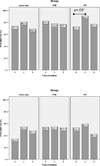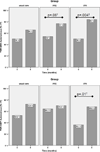Family partner intervention influences self-care confidence and treatment self-regulation in patients with heart failure
- PMID: 25673525
- PMCID: PMC4532663
- DOI: 10.1177/1474515115572047
Family partner intervention influences self-care confidence and treatment self-regulation in patients with heart failure
Abstract
Background: Heart failure self-care requires confidence in one's ability and motivation to perform a recommended behavior. Most self-care occurs within a family context, yet little is known about the influence of family on heart failure self-care or motivating factors.
Aims: To examine the association of family functioning and the self-care antecedents of confidence and motivation among heart failure participants and determine if a family partnership intervention would promote higher levels of perceived confidence and treatment self-regulation (motivation) at four and eight months compared to patient-family education or usual care groups.
Methods: Heart failure patients (N=117) and a family member were randomized to a family partnership intervention, patient-family education or usual care groups. Measures of patient's perceived family functioning, confidence, motivation for medications and following a low-sodium diet were analyzed. Data were collected at baseline, four and eight months.
Results: Family functioning was related to self-care confidence for diet (p=0.02) and autonomous motivation for adhering to their medications (p=0.05) and diet (p=0.2). The family partnership intervention group significantly improved confidence (p=0.05) and motivation (medications (p=0.004; diet p=0.012) at four months, whereas patient-family education group and usual care did not change.
Conclusion: Perceived confidence and motivation for self-care was enhanced by family partnership intervention, regardless of family functioning. Poor family functioning at baseline contributed to lower confidence. Family functioning should be assessed to guide tailored family-patient interventions for better outcomes.
Keywords: Heart failure; family interventions; low-sodium diet; medication administration; self-care confidence.
© The European Society of Cardiology 2015.
Conflict of interest statement
Figures



References
-
- Mokdad AH, Marks JS, Stroup DF, Gerberding JL. Correction: actual causes of death in the United States, 2000. JAMA. 2005;293(3):293–294. - PubMed
-
- Chesla CA. Do family interventions improve health? J Fam Nurs. 2010;16(4):355–377. - PubMed
-
- Hartmann M, Bäzner E, Wild B, Eisler I, Herzog W. Effects of interventions involving the family in the treatment of adult patients with chronic physical diseases: a meta-analysis. Psychother Psychosom. 2010;79(3):136–148. - PubMed
-
- Martire LM. The "relative" efficacy of involving family in psychosocial interventions for chronic illness: are there added benefits to patients and family members? Families, Systems & Health. 2005;23(3):312–328.
Publication types
MeSH terms
Grants and funding
LinkOut - more resources
Full Text Sources
Other Literature Sources
Medical

